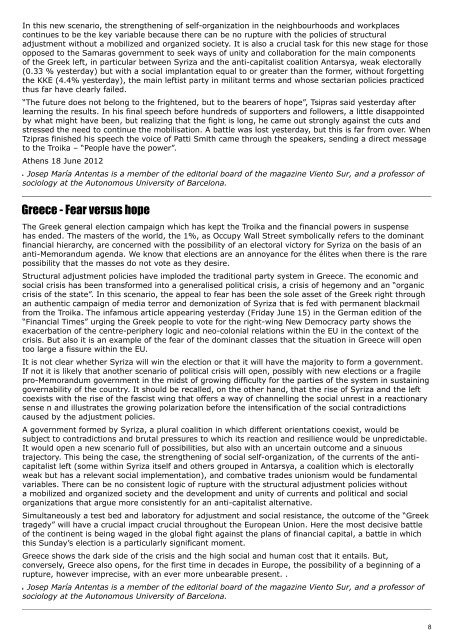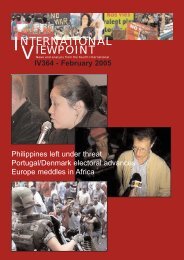Here - International Viewpoint
Here - International Viewpoint
Here - International Viewpoint
You also want an ePaper? Increase the reach of your titles
YUMPU automatically turns print PDFs into web optimized ePapers that Google loves.
In this new scenario, the strengthening of self-organization in the neighbourhoods and workplaces<br />
continues to be the key variable because there can be no rupture with the policies of structural<br />
adjustment without a mobilized and organized society. It is also a crucial task for this new stage for those<br />
opposed to the Samaras government to seek ways of unity and collaboration for the main components<br />
of the Greek left, in particular between Syriza and the anti-capitalist coalition Antarsya, weak electorally<br />
(0.33 % yesterday) but with a social implantation equal to or greater than the former, without forgetting<br />
the KKE (4.4% yesterday), the main leftist party in militant terms and whose sectarian policies practiced<br />
thus far have clearly failed.<br />
“The future does not belong to the frightened, but to the bearers of hope”, Tsipras said yesterday after<br />
learning the results. In his final speech before hundreds of supporters and followers, a little disappointed<br />
by what might have been, but realizing that the fight is long, he came out strongly against the cuts and<br />
stressed the need to continue the mobilisation. A battle was lost yesterday, but this is far from over. When<br />
Tzipras finished his speech the voice of Patti Smith came through the speakers, sending a direct message<br />
to the Troika – “People have the power”.<br />
Athens 18 June 2012<br />
Josep María Antentas is a member of the editorial board of the magazine Viento Sur, and a professor of<br />
sociology at the Autonomous University of Barcelona.<br />
Greece - Fear versus hope<br />
The Greek general election campaign which has kept the Troika and the financial powers in suspense<br />
has ended. The masters of the world, the 1%, as Occupy Wall Street symbolically refers to the dominant<br />
financial hierarchy, are concerned with the possibility of an electoral victory for Syriza on the basis of an<br />
anti-Memorandum agenda. We know that elections are an annoyance for the élites when there is the rare<br />
possibility that the masses do not vote as they desire.<br />
Structural adjustment policies have imploded the traditional party system in Greece. The economic and<br />
social crisis has been transformed into a generalised political crisis, a crisis of hegemony and an “organic<br />
crisis of the state”. In this scenario, the appeal to fear has been the sole asset of the Greek right through<br />
an authentic campaign of media terror and demonization of Syriza that is fed with permanent blackmail<br />
from the Troika. The infamous article appearing yesterday (Friday June 15) in the German edition of the<br />
“Financial Times” urging the Greek people to vote for the right-wing New Democracy party shows the<br />
exacerbation of the centre-periphery logic and neo-colonial relations within the EU in the context of the<br />
crisis. But also it is an example of the fear of the dominant classes that the situation in Greece will open<br />
too large a fissure within the EU.<br />
It is not clear whether Syriza will win the election or that it will have the majority to form a government.<br />
If not it is likely that another scenario of political crisis will open, possibly with new elections or a fragile<br />
pro-Memorandum government in the midst of growing difficulty for the parties of the system in sustaining<br />
governability of the country. It should be recalled, on the other hand, that the rise of Syriza and the left<br />
coexists with the rise of the fascist wing that offers a way of channelling the social unrest in a reactionary<br />
sense n and illustrates the growing polarization before the intensification of the social contradictions<br />
caused by the adjustment policies.<br />
A government formed by Syriza, a plural coalition in which different orientations coexist, would be<br />
subject to contradictions and brutal pressures to which its reaction and resilience would be unpredictable.<br />
It would open a new scenario full of possibilities, but also with an uncertain outcome and a sinuous<br />
trajectory. This being the case, the strengthening of social self-organization, of the currents of the anticapitalist<br />
left (some within Syriza itself and others grouped in Antarsya, a coalition which is electorally<br />
weak but has a relevant social implementation), and combative trades unionism would be fundamental<br />
variables. There can be no consistent logic of rupture with the structural adjustment policies without<br />
a mobilized and organized society and the development and unity of currents and political and social<br />
organizations that argue more consistently for an anti-capitalist alternative.<br />
Simultaneously a test bed and laboratory for adjustment and social resistance, the outcome of the “Greek<br />
tragedy” will have a crucial impact crucial throughout the European Union. <strong>Here</strong> the most decisive battle<br />
of the continent is being waged in the global fight against the plans of financial capital, a battle in which<br />
this Sunday’s election is a particularly significant moment.<br />
Greece shows the dark side of the crisis and the high social and human cost that it entails. But,<br />
conversely, Greece also opens, for the first time in decades in Europe, the possibility of a beginning of a<br />
rupture, however imprecise, with an ever more unbearable present. .<br />
Josep María Antentas is a member of the editorial board of the magazine Viento Sur, and a professor of<br />
sociology at the Autonomous University of Barcelona.<br />
8









